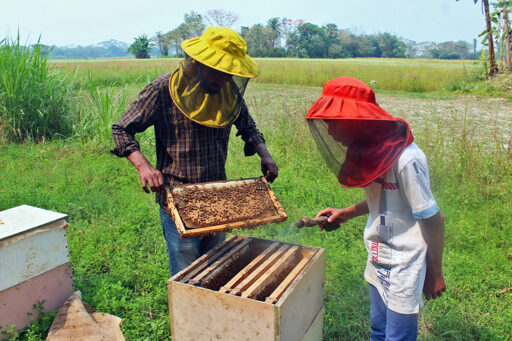Experts warn the indiscriminate use of insecticides by farmers in Bangladesh to protect their crops is harming beneficial honey bees, Mongabay contributor Sadiqur Rahman reported in March. Beekeeper Pavel Hossen, who set up an apiary on land next to a black cumin farm, hoped his honey bees (Apis mellifera) would feed on the flowers of the cumin crops and collect nectar. But Hossen told Rahman his hives didn’t fill up with as much honey he expected. “Bees cannot forage freely across insecticide-treated crop fields. Their population growth is also slowing down,” he said. His neighbor Abdul Hakim, who owns the cumin farm, said he uses chemicals that sellers suggest. Among the popular chemicals being peddled to farmers like Hakim are neonicotinoids that are used on crops such as rice, wheat and black cumin. These pesticides are meant to kill agricultural pests, including brown planthoppers, aphids and mealybugs. In fact, neonicotinoids and other agricultural chemicals are being increasingly used in Bangladesh and are now found in 600 brand products. But Rahman reported that most farmers are unaware of the chemicals’ appropriate doses or the effects of their excessive use on pollinators like honey bees. “Because of food shortages, limited foraging grounds and frequent poisoning from insecticides, the population of honey bees is decreasing alarmingly,” Nurul Islam, executive director of the Bangladesh Institute of Apiculture, told Rahman. There’s been no nationwide bee population survey in Bangladesh, but in 2019, the Food and Agricultural Organization of the U.N. warned of bee populations declining in many parts…This article was originally published on Mongabay
From Conservation news via this RSS feed


